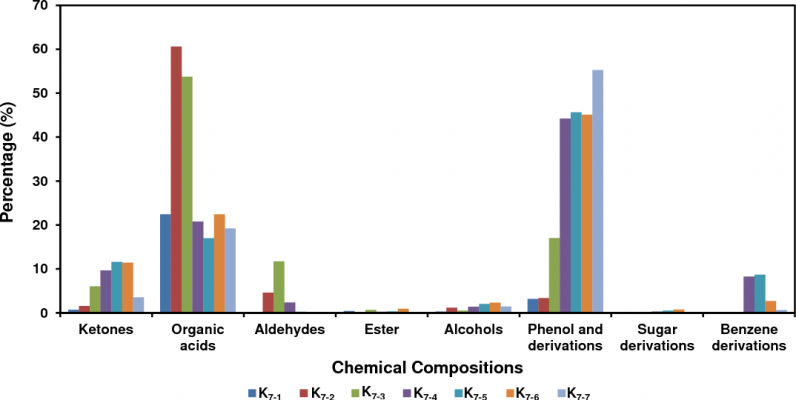Wood Vinegar Definition
Wood vinegar or wood acid is a brown, cloudy or clear brown liquid obtained from the proliferation process. The quality and efficiency of this product is directly dependent on the precise control of temperature and time in this process, as well as considering the material used and the dose and concentration of wood vinegar relative to the soil or plant in which this product is to be used.
This fragrant substance has a low PH (about 3), while the amount of organic matter of this substance reaches 8%, which in addition, has a high seeping power. Wood vinegar is composed of 200 different compounds, all of which are organic and completely harmless. The main constituents of wood vinegar are as follows:
- Water
- Methanol
- Acetic acid
- Ketone
- Ethyl Valerate (ester)

The most important organic compound in wood vinegar is acetic acid, which makes up 3 to 7% of it and 50 to 70% of its organic matter. The various ingredients in this product make the efficiency of this product bring extraordinary results for organic use in different purposes.
History
The use of this substance in ancient times for various purposes such as medicine, food and agriculture was limited to certain geographical areas. In the middle of the sixteenth century, the German chemist Johann Rudolf Glauber was able to evaluate this substance professionally. But it was mostly used at that time as food or to treat wounds and diseases.
From the beginning of the nineteenth century, the use of this product became very popular, but it was used to flavor food products. In the late nineteenth century, with extensive research on this substance, scientists realized the significant impact of this product on agricultural products, and as a result, the use of wood vinegar for agricultural use in developed countries such as Japan, Australia and the United States has flourished.
Why Use Wood Vinegar
Wood vinegar increases the ability of plants to absorb nutrients from the soil as well as the ability of its defense system. Since this substance is obtained from the destruction of wood, it also contains the nutrients required by the plant and enriches the soil, so its use not only increases the quality of the soil and eliminates soil pests, but also strengthens the roots of the plant and increases root absorption, thickens branches, stems and leaves, and also accelerates seed germination and plant growth.
The fruits of the trees on which wood vinegar is consumed are larger, bolder, sweeter, and also more durable. Due to the high permeability of compounds such as alcohol, ketones and aldehydes, by adding wood vinegar to plant leaves, this product is quickly absorbed by plants.
This product is 100% organic, non-toxic and completely biodegradable. Wood vinegar can reduce the water requirement by one third and thus increase the plant’s resistance to dehydration. The use of wood vinegar reduces the need for fertilizer and also accelerates the effect of fertilizer on the plant. Adding it to animal manure eliminates its bad smell and facilitates the composting process.
In short, it can be concluded that wood vinegar is a high-density organic liquid with appropriate commercial economic costs, which is commensurate with the existing supply chain and farm infrastructure. This product is a sustainable organic food source that reduces dependence on costly chemical companies.
Other usages of this product
The use of wood vinegar as an additive in animal feed increases the quality and taste of meat. Wood vinegar is also a regulator of the animal’s digestive system, which results in better use of nutrients in the feed and thus reduces the need for animal feed.
One of the unique properties of wood vinegar is that it plays the role of a strong but completely harmless and organic agricultural poison; repelling insects and pests from the plant, preventing the spread of fungal, bacterial and viral diseases to the plant and at the same time the absence of unpleasant odor in this product, emphasizes the role of wood vinegar as an effective and organic poison. Therefore, its natural content and reasonable price make it a suitable alternative for pesticides and chemical fertilizers.
For more information and articles on wood vinegar and the benefits of using it in various fields, please visit the Australian Wood Vinegar Articles Database: Link
For more information about the benefits and properties of wood vinegar, please refer to this page: Benefits and Features of Wood Vinegar
Prepared by Scientific Group of the Fifth Season



